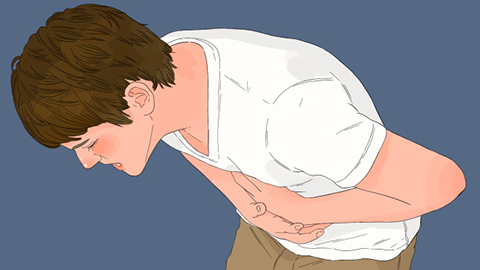What are the symptoms of gastrointestinal bleeding?
Generally, the symptoms of gastric bleeding vary depending on the amount and speed of the bleeding. Common symptoms mainly include hematemesis (vomiting blood), black tarry stools, abdominal pain, dizziness and weakness, and palpitations. The specific symptoms are analyzed as follows:

1. Hematemesis: When there is a large amount of bleeding and the bleeding speed is fast, blood irritating the stomach can cause vomiting, resulting in hematemesis. The color of the vomited blood might be bright red, or it might appear coffee-colored after reacting with gastric acid if the blood remains in the stomach for a longer period. In some cases, the vomit may also contain blood clots.
2. Black Stools: This is one of the typical symptoms of gastric bleeding. Even with minimal bleeding, blood passing through the digestive tract becomes digested, causing the stool to turn black, tarry, sticky, and glossy. Some patients may also experience increased frequency of bowel movements or a frequent urge to defecate.
3. Abdominal Pain: Most patients with gastric bleeding experience abdominal pain, varying in intensity. The pain might be dull, distended, or burning in nature and usually occurs in the upper abdomen. If the bleeding is caused by gastric or duodenal ulcers, the pain may follow a certain pattern, such as worsening when the stomach is empty.
4. Dizziness and Weakness: When gastric bleeding leads to a reduction in blood volume, insufficient blood supply to the brain causes dizziness. At the same time, the body experiences weakness, fatigue, listlessness, and pallor due to insufficient energy supply from blood loss. In severe cases, symptoms such as unsteady standing and visual darkening may occur.
5. Palpitations: Blood loss causes the heart to beat faster compensatorily to maintain circulation, making patients feel palpitations and tachycardia (rapid heartbeat). Some patients may also experience chest tightness and shortness of breath. If the bleeding continues to increase, palpitations become more pronounced, and there may even be a risk of shock.
After the occurrence of gastric bleeding symptoms, patients should immediately stop eating to avoid increasing the burden on the stomach, while maintaining quiet rest and avoiding strenuous activity. Subsequent treatment should follow medical advice for targeted interventions. In daily diet, patients should gradually transition from liquid and semi-liquid foods to soft foods, avoiding spicy and hard foods to facilitate gastric recovery.




